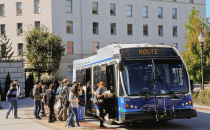SELC op-ed: NCDOT should look beyond road building to projects that build stronger communities
As the North Carolina Department of Transportation faces multiple challenges made worse by the global health crisis at hand, now is our chance to re-evaluate the value of spending billions to shave mere minutes off commutes when so many other smaller-scale, community-focused projects that offer alternatives to clogged highways go unfunded.
Read the full op-ed, as written by Senior Attorney Kym Hunter and published in the News & Observer, here. An excerpt is below.
Transportation policy in North Carolina has long focused on a single uncompromising objective: moving cars as fast as possible with the false promise that speed feeds economic growth.
We have pursued “saved minutes” at any cost. Last year the state proudly announced a $2.2 billion investment in a new highway that (might) save (some) commuters a full . . . ten minutes.
Ten minutes. At this moment, when many of us sit quietly in our homes and the state budget is in crisis, can we not marvel that we would ever spend so much to achieve so little? Were our lives really so frenetic, so over-scheduled, that we were prepared to pay any price to reclaim a few minutes of driving? To get to our next meeting just a little bit faster?
We build and build. We spend and spend. But when was the last time we stopped to ask what we are getting for all that money? Current economic challenges put that question in sharp focus.
The pandemic hit our Department of Transportation hard financially. But the department was already in trouble. Extreme weather – made worse by climate change – meant millions of dollars of unbudgeted repairs. And a recent state audit revealed breathtaking mismanagement and overspending by $740 million.
The department will seek a bailout from the General Assembly. But whatever help it receives should come with expectations for better fiscal accountability and a new vision.
DOT must recognize that healthy and economically thriving communities need more than new, wider expensive highways.
…
As we rethink strategy, we should consider three big questions:
- How much do we actually need to spend? If we discard the thinking that it is worth spending millions to save a few minutes, can we get more bang for our buck in our communities?
- How can we generate revenue? With the gas tax no longer sustainable, we must look for new solutions. Could a tax on carbon pollution generate new revenue?
- How can we make our system more resilient and equitable? When we emerge from COVID-19 many crises will remain. Climate change and deep-rooted racial and socioeconomic inequities are challenges our transportation system must face head on.
Our transportation system is broken. Now is the time to rethink and rebuild. We will come through this current crisis together. When we do, let’s be sure that as we face our next challenges we are ready: with a system that works for all, respects economic efficiency, and is resilient for the long term.

